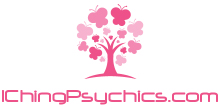Well that’s a loaded question. The simple answer is that “I Ching” translates to “Book of Changes”. The Chinese have created in it (and continue to build) the oldest oracle text in the world. The I Ching is a collection of texts covering a range of topics like philosophy, psychic discovery, and general wisdom. It includes poetry and prose, artwork and advice. Everything is divided between 64 chapters, each of which has a corresponding hexagram.
A hexagram is a stack made of 6 lines. Some are solid lines and some are broken. There are multiple methods to building your hexagram. You can flip a coin or pull marbles from a bag. Yarrow sticks are also a popular choice. Each coin flip tells you whether to use a broken or solid line until your hexagram is complete. Then, you can reference the corresponding chapter of knowledge to seek guidance. The picture made with your hexagrams sticks is actually supposed to represent the energy flowing through your situation, which can give some insight depending on the type of guidance you’re looking for.
What can I Ching do?
The I Ching answers your questions. It boils your situation down to it’s fundamental layers and then offers insight based on those elements. One of it’s most popular uses is to give advice regarding relationships. I Ching can tell you how to resolve disagreements with those you care about by giving you feedback about the other person’s perspective. This is an invaluable tool when communicating with the other person is not easy.
Is I Ching a Fortune teller?

I Ching is not a divination tool in the popular sense. It can predict, but only as far as telling you what challenges to expect depending on the path you choose going forward. It will not predict decisions you have yet to make. It can, however, give you advice on how best to make those decisions; and that is still highly-valuable. Your future is still up to you.
How do I learn to use it?
The best way to begin understanding how the I Ching works is to jump right in. Find a translation (not a summary) and start asking questions. Like Tarot, you can just cast a spread for the day with no specific inquiry in mind. Review it at the beginning of the day, and then analyze it again at the end. Over time you’ll cast different hexagrams and start to understand how they apply to your life.
Understand that the imagery in the I Ching dates back millenia. It may be a challenge at first to apply the advice you receive to modern-day situations. A divination reader may be helpful early on to help you see how the guidance applies to you. If you want answers quickly, enlist this sort of mentor.
Don’t I need Psychic abilities?

Not at all. The I Ching does not hide it’s insights away. You just need patience and an open mind to discern the message it is sending. You will start out understanding the hexagrams at their most basic level. The more you work, the more information you will glean from it.
Who uses the I Ching?
The I Ching has been slow to catch on in Western cultures, probably because it is not easy to simplify down to black and white interpretations that are easy to digest. Each experience with it is highly personalized and so it requires more effort starting out than other divination methods. It is also difficult to find quality and thorough translations of the original texts, and simplified version do a disservice to your divination efforts. But it is usually not difficult to find a knowledgeable I Ching practitioner, as many have spent decades studying this practice. Do not feel that it is too late to gain the wisdom available to you. The I Ching is a wonderful advisor to your best life.



While I appreciate the historical significance of the I Ching, labeling it as a ‘wonderful advisor’ feels overly optimistic. Can it really provide actionable guidance?
‘Actionable guidance’? Have you ever tried using it? It’s more about introspection than step-by-step instructions!
That’s a valid point, SkepticalSamurai. However, many find personal meaning in its insights despite their abstract nature.
‘The Book of Changes’ is an apt title indeed! The dynamic interplay between solid and broken lines beautifully mirrors life’s uncertainties.
This article brilliantly encapsulates the depth and complexity of the I Ching. It’s fascinating how such an ancient text can still provide relevant insights today!
Indeed, QuantumMuse! The timeless wisdom embedded in the I Ching is a testament to its enduring relevance.
Or perhaps it’s just a bunch of vague platitudes dressed up in poetic language. How convenient!